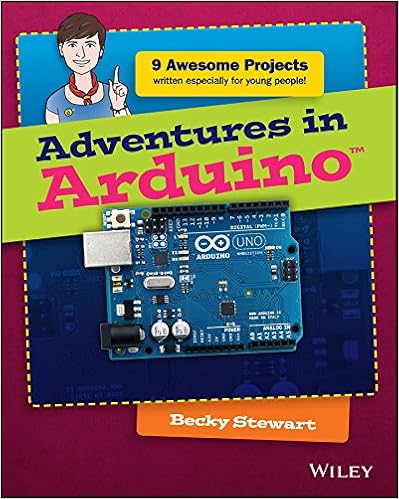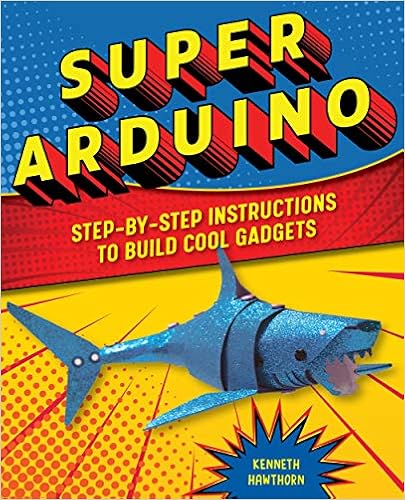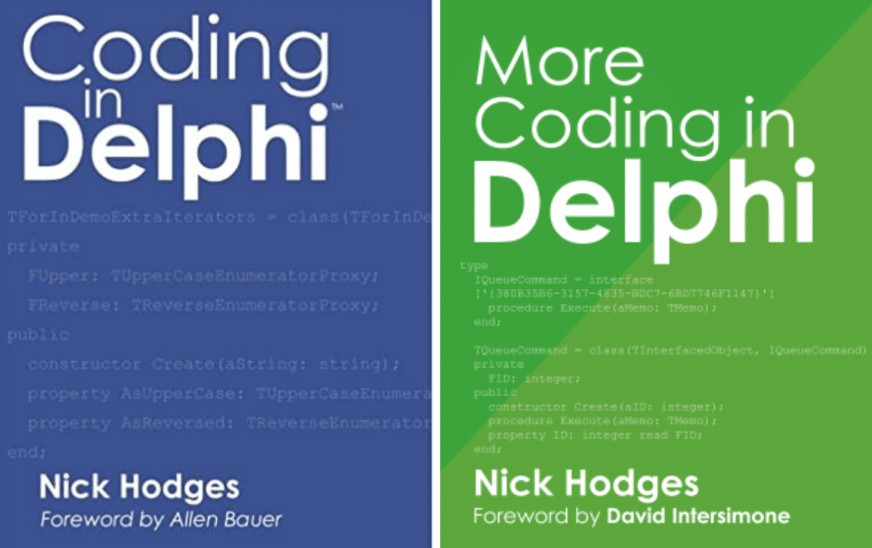The Arduino is a small microcontroller board that you can program to read information from the world around you and send commands to the outside world. Basically, the Arduino controls outputs and reads inputs. The outputs can be an LED or a motor, and inputs can be potentiometers, buttons or sensors.
Check out 10 Best Arduino Development Books of 2020 you can read!

1.Adventures in Arduino
Author: Becky Stewart
Publisher: Wiley; 1 edition (May 4, 2015)
Adventures in Arduino is the beginner's guide to Arduino programming, designed specifically for 11-to 15-year olds who want to learn about Arduino, but don't know where to begin. Starting with the most basic concepts, this book coaches you through nine great projects that gradually build your skills as you experiment with electronics. The easy-to-follow design and clear, plain-English instructions make this book the ideal guide for the absolute beginner, geared toward those with no computing experience. Each chapter includes a video illuminating the material, giving you plenty of support on your journey to electronics programming.
Arduino is a cheap, readily available hardware development platform based around an open source, programmable circuit board. Combining these chips with sensors and servos allows you to gain experience with prototyping as you build interactive electronic crafts to bring together data and even eTextiles. Adventures in Arduino gets you started on the path of scientists, programmers, and engineers, showing you the fun way to learn electronic programming and interaction design.

2.Super Arduino: Step-by-Step Instructions to Build Cool Gadgets
Author: Kenneth Hawthorn
Publisher: Rockridge Press (December 17, 2019)
Welcome to the wonderful wired world of Arduino―the flexible open-source electronics platform for creators. Become a coding superhero with Super Arduino―the easiest step-by-step, project-based guide for beginners who want to learn the latest tips and tricks while taking their DIY programming skills to the next level.
Let your engineering imagination run wild. In this Arduino project workbook, you’ll learn how to create great gadgets like a fabulous flag-waver, flashing disco shoes, a crazy clock, flip-a-switch with Wi-Fi, and even an echolocation distance sensor―like a bat! So what are you waiting for?

3.Programming Arduino Next Steps: Going Further with Sketches
Author: Simon Monk
Publisher: McGraw-Hill Education Tab; 1 edition (October 16, 2013)
In this practical guide, electronics guru Simon Monk takes you under the hood of Arduino and reveals professional programming secrets. Featuring coverage of the Arduino Uno, Leonardo, and Due boards, Programming Arduino Next Steps: Going Further with Sketches shows you how to use interrupts, manage memory, program for the Internet, maximize serial communications, perform digital signal processing, and much more. All of the 75+ example sketches featured in the book are available for download.

4.Exploring Arduino
Author: Jeremy Blum
Publisher: Wiley; 1 edition (July 22, 2013)
Written by Arduino expert Jeremy Blum, this unique book uses thepopular Arduino microcontroller platform as an instrument to teachyou about topics in electrical engineering, programming, andhuman-computer interaction. Whether you're a budding hobbyist or anengineer, you'll benefit from the perfectly paced lessons that walkyou through useful, artistic, and educational exercises thatgradually get more advanced. In addition to specific projects, thebook shares best practices in programming and design that you canapply to your own projects. Code snippets and schematics will serveas a useful reference for future projects even after you'vemastered all the topics in the book.

5.Beginning C for Arduino, Second Edition: Learn C Programming for the Arduino
Author: Jack Purdum
Publisher: Apress; 2nd ed. edition (July 1, 2015)
Beginning C for Arduino, Second Edition is written for those who have no prior experience with microcontrollers or programming but would like to experiment and learn both. Updated with new projects and new boards, this book introduces you to the C programming language, reinforcing each programming structure with a simple demonstration of how you can use C to control the Arduino family of microcontrollers. Author Jack Purdum uses an engaging style to teach good programming techniques using examples that have been honed during his 25 years of university teaching.

6.Programming Arduino: Getting Started with Sketches, Second Edition (Tab)
Author: Simon Monk
Publisher: McGraw-Hill Education TAB; 2 edition (June 9, 2016)
This thoroughly updated guide shows, step by step, how to quickly program all Arduino models. Programming Arduino: Getting Started with Sketches, Second Edition, features easy to follow explanations, fun examples, and downloadable sample programs. Discover how to write basic sketches, use Arduino’s modified C language, store data, and interface with the Web. You will also get hands on coverage of C++, library writing, and programming Arduino for the Internet of Things. No prior programming experience is required!

7.Getting Started with Arduino: The Open Source Electronics Prototyping Platform (Make)
Author: Massimo Banzi (Author), Michael Shiloh (Author)
Publisher: Make Community, LLC; 3 edition (December 28, 2014)
Arduino is the open source electronics prototyping platform that has taken the Maker Movement by storm. This thorough introduction, updated for the latest Arduino release, helps you start prototyping right away. From obtaining the required components to putting the final touches on your project, all the information you need is here!
Getting started with Arduino is a snap. To use the introductory examples in this guide, all you need is an Arduino Uno or Leonardo, along with a USB cable and an LED. The easy-to-use, free Arduino development environment runs on Mac, Windows, and Linux.

8.Arduino Workshop: A Hands-On Introduction with 65 Projects
Author: https://amzn.to/3bet1SC
Publisher: No Starch Press; 1 edition (May 13, 2013)
The Arduino is a cheap, flexible, open source microcontroller platform designed to make it easy for hobbyists to use electronics in homemade projects. With an almost unlimited range of input and output add-ons, sensors, indicators, displays, motors, and more, the Arduino offers you countless ways to create devices that interact with the world around you.
In Arduino Workshop, you'll learn how these add-ons work and how to integrate them into your own projects. You'll start off with an overview of the Arduino system but quickly move on to coverage of various electronic components and concepts. Hands-on projects throughout the book reinforce what you've learned and show you how to apply that knowledge. As your understanding grows, the projects increase in complexity and sophistication.

9.Arduino For Dummies
Author: John Nussey
Publisher: For Dummies; 1 edition (May 28, 2013)
This is no ordinary circuit board. Arduino allows anyone,whether you're an artist, designer, programmer or hobbyist, tolearn about and play with electronics. Through this book you learnhow to build a variety of circuits that can sense or control thingsin the real world. Maybe you'll prototype your own product orcreate a piece of interactive artwork? This book equips you witheverything you'll need to build your own Arduino project, but whatyou make is up to you! If you're ready to bring your ideas into thereal world or are curious about the possibilities, this book is foryou.

10.30 Arduino Projects for the Evil Genius, Second Edition
Author: Simon Monk
Publisher: McGraw-Hill Education Tab; 2 edition (May 27, 2013)
Fully updated throughout, this do-it-yourself guide shows you how to program and build fascinating projects with the Arduino Uno and Leonardo boards and the Arduino 1.0 development environment. 30 Arduino Projects for the Evil Genius, Second Edition, gets you started right away with the simplified C programming you need to know and demonstrates how to take advantage of the latest Arduino capabilities.
You'll learn how to attach an Arduino board to your computer, program it, and connect electronics to it to create your own devious devices. A bonus chapter uses the special USB keyboard/mouse-impersonation feature exclusive to the Arduino Leonardo.




